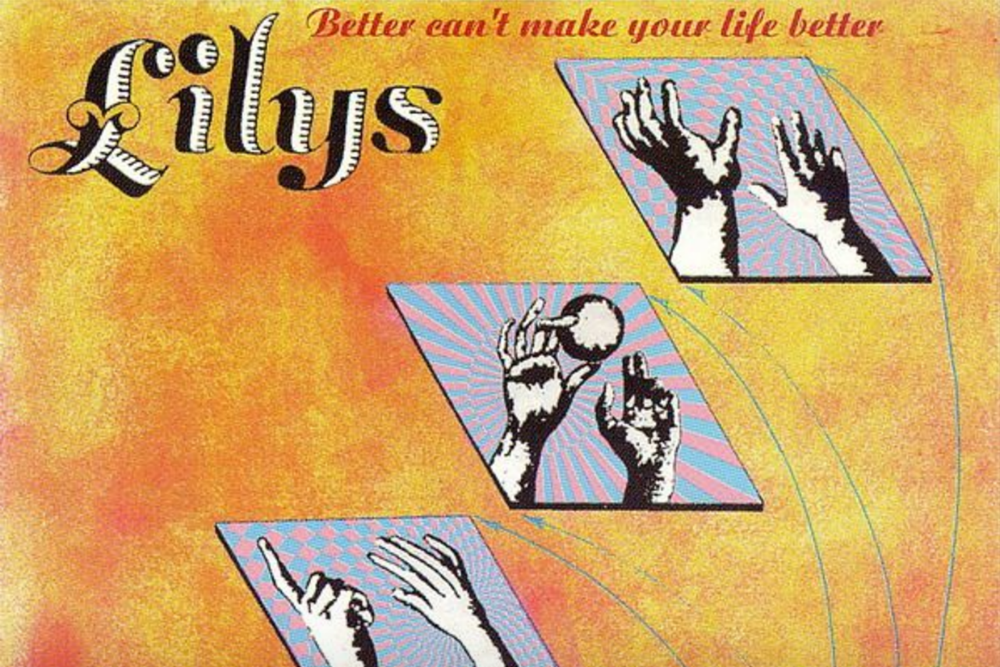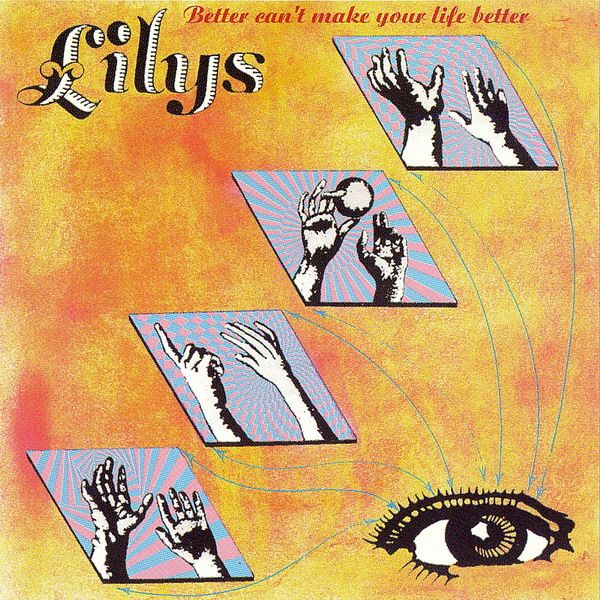There’s a moment on Lilys’ 1996 album Better Can’t Make Your Life Better, where you find yourself wondering “What exactly am I listening to?”
It happens on the first track.
For a first-time listener, it’s bewildering, a mish-mash of 60s jangle, R&B (in the old use of the term), and garage band scuzz. It sounds like the Monkees jamming with The Who on Jupiter. Which is a compliment, obviously.
But if you’d been at all familiar with the Washington D.C. band, then it really was a curveball. Over the course of two well-received but obscure albums, Lilys had established themselves as one of America’s best shoegaze bands, mixing punishing noise with dreamy atmospherics. This transformation into a 60s garage band was abrupt and abrasive, like Nirvana had followed up Nevermind with an album of calypso music.
However, a crucial part of Lilys DNA has always been influence, and in a realistic sense, their history belongs to other people. The far out sounds they’ve made in their almost 30 year musical odyssey have frequently come from a creative seed that was never their own, causing the listener to really consider just what ‘influence’ means.
We live in a strange time for pop culture. The means by which we consume it have vastly changed, and whilst pop music was always meant to be kind of disposable, the sheer speed at which we pick this stuff up and forget about it is staggering. But for a lot of people, there’s a lingering sense that we’ve heard it all before, that all that lies on the horizon is washed out copies of stuff we’ve already been through. Sure, there’s always people trying to reinvent the wheel, to take music in new and exciting directions (with varying degrees of success), but for the last twenty years or so, the core theme of popular music has been reinvention; taking the basic building blocks of the past, and reusing them to create something new.
And while this has still produced some truly excellent music, if you can attach the word ‘revival’ to a particular style of music, then it can never really claim ‘originality’ as part of its impact.
But is this really such a bad thing?
Back in 1992, Lilys released their debut album, In the Presence of Nothing, and from the opening bars, it wraps itself around you and refuses to let go. Clothed in layers of distorted guitars, the album is a tour-de-force of shoegazing dynamics, full of warped melodies that bend out of shape in front of you, textured sound, vocals buried under mountains of fuzz, and blasts of noise that cause the endorphins to kick in.
Which is pretty much exactly what My Bloody Valentine were doing at the same time.Loveless is a towering masterpiece in indie-rock history, an album that is so distinctive that any attempt to utilise any of its sonic palette results in a carbon copy, rather than something new. Rather than opening the world to new sounds, Loveless closed the door on a particular style of music, essentially proclaiming it ‘completed’. Game over.
So it would stand to reason that In the Presence of Nothing is a poor-man’s Loveless, a slavish copy which adds nothing to the original. And for the most part, this is correct. Only instead of adding nothing, it takes us on a totally different journey, travelling to places that Loveless never dared to. In a strange way, by sticking so closely to a particular musical blueprint, Kurt Heasley (who, alongside a revolving door of musicians that would make Spinal Tap blush, has always been the core of Lilys), created something that can’t be called a rip-off, because it’s so unashamedly in awe of the source material. Where other bands copied the tone-bending guitar of Kevin Sheilds, or the cooing vocals of Belinda Butcher, but tried to pass it off as something of their own, Kurt Heasley leaves you in no doubt that this sounds like My Bloody Valentine. It’s meant to.
Lilys’ second album, Eccsame the Photon Band (1994) ploughs a similar furrow, using the same basic elements of their debut, but bringing the noise down a notch, and letting the songs step forward a little. But the My Bloody Valentine influence is still front and centre, and much as music fans were left wondering how Kevin Sheilds would follow upLoveless (for quite a long time, as it turned out) Heasley has imagined a world where My Bloody Valentine moved on to a different sound, letting the songs that were always at the core of the records take centre stage.
As such, the dreamlike texture is still there, but the sweet voice of Heasley is finally audible, with his idiosyncratic lyrics laid bare for all to see. On ‘The Hermit Crab’, against an irresistible sunshine guitar melody, Heasley sings, “I’ve eaten off your arms, to keep you from doing harm to yourself”, like it’s the most natural thing in the world, and finally Lilys emerge from their own proverbial shell as an entity in their own right. This isn’t a copy of My Bloody Valentine, because (at the time) My Bloody Valentine never got this far.
Eccsame the Photon Band is a tremendous album, more distinctive than In the Presence of Nothing, but also sounding totally familiar at the same time. By turns beguiling and unusual, it’s also somehow comforting, a soothing album that is satisfying from start to finish. And to follow it up, Heasley ditched literally everything about the sound he’d created (or the sound that someone else created), and attained a visibility that the fervent few who followed his music could never have thought possible.
Appearing in a Levi’s commercial, ‘A Nanny in Manhattan’ was the sound of a different band. And the band in question was probably The Monkees. Or some other long forgotten LA garage band of the 60s. Jangly guitars, brash rhythms, and upfront vocals assault the listener, like the sound of four or five bands playing different songs simultaneously. But with a surplus of hooks, the song grabs the listener from the first second, and in 1998, became the band’s only hit single, peaking at #16 in the UK charts.
In doing so, it dragged its parent album, 1996’s Better Can’t Make Your Life Better to the biggest audience the band had faced yet. And after being teased by the miniature pop-symphony of ‘A Nanny in Manhattan’, which lingers in the mind long after its scant 1’58 runtime, it’s pretty certain that a large part of this new audience put on the album once and never returned to it.
Melodically, Better Can’t Make Your Life Better is baffling, a myriad of 60s influenced pop vocals, with fast-paced songs that twist and turn like they’re squirming under the intense glare of a microscope. The average song on the record (if there can be said to be such a thing) goes through several different sections, rarely settling into a standard verse/chorus structure, and rarely repeating anything you’ve heard before. Just when you get your head wrapped around how a tune works, it jumps, and something else comes in, never quite returning to what you’d just heard.
Songs like ‘Shovel into Spade Kit’ and ‘Elevator is Temporary’ are at times exhausting, but repeated listening reaps rewards, with the tight structures beginning to make some kind of sense the more you listen to them. But always there’s that disconnect between what you’re hearing, and what you’re expecting to hear. This sounds like The Monkees, The Who, The Zombies, The Count Five, The Seeds, and many more, but at the same time, it sounds NOTHING like them.
Even when The Monkees went into the outer reaches of the inner mind for Head, their crazy psychedelic mess of a film and album, a career-killing statement that still retains power to this day, they still didn’t sound as wigged out as Lilys, despite the musical textures being exactly the same. In a possibly apocryphal story, I recall Heasley recounting an anecdote where he’d broken his leg, and spent an entire summer sitting by the poolside in Apples in Stereo frontman Robert Schneider’s house. Whilst recuperating, endlessly listening to an old cassette of The Monkees, he became convinced that they had made the most perfect song ever, and that all popular music could draw its DNA from that.
That all sounds too good to be true, but it certainly explains a lot about why Better Can’t Make Your Life Better sounds the way it does. Much as he had done with My Bloody Valentine, Heasley perfected the sounds he needed, studied the kind of songs that had been made with those sounds, and then made new ones. And while the UK was lost in the heady days of Britpop, with bands queuing up to strip-mine the sounds of the 60s, Lilys didn’t sound like a retro band, or a pastiche. These songs couldn’t have existed in 1966, they wouldn’t have made any sense then. But somehow, they made perfect sense in 1996, and while there’s no-doubt that the band couldn’t have ever capitalised on the attention that being in a Levi’s advert would give them, they almost certainly came out of the whole experience better off.
The 3-Way (1999) and Precollection (2003) found Heasley turning The Kinks influence up to 11, occasionally bringing in hints of bands like Echo & The Bunnymen, whileEverything Wrong is Imaginary (2006) brought them back towards the shoegazing sounds of their first two albums. But those first three albums (and a mini-album, A Brief History of Amazing Letdowns, released in 1994) are still startling in their capacity to incorporate and encapsulate the art of someone else, and repurpose it to thrilling, if not new, creative avenues.
If we are in a time when it feels like everything has been done before, and there’s nothing new left to say, perhaps Lilys show that homage, in its purest form, can be something beautiful, a kind of musical ‘what if’ exercise that can transcend its humble origins. In some shape or form, Kurt Heasley is still out there, still making music, and with parts of Lilys’ back catalogue slowly re-emerging through reissues, perhaps the time has come to celebrate his achievements, a creative talent who can elevate mimicry into an art form, and use it to say something new.





